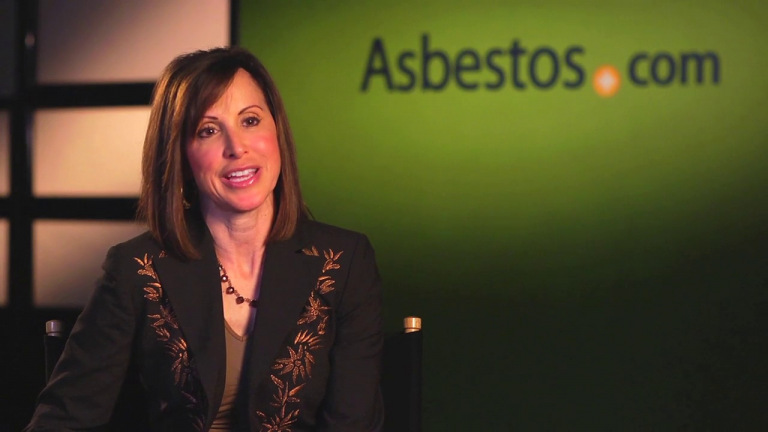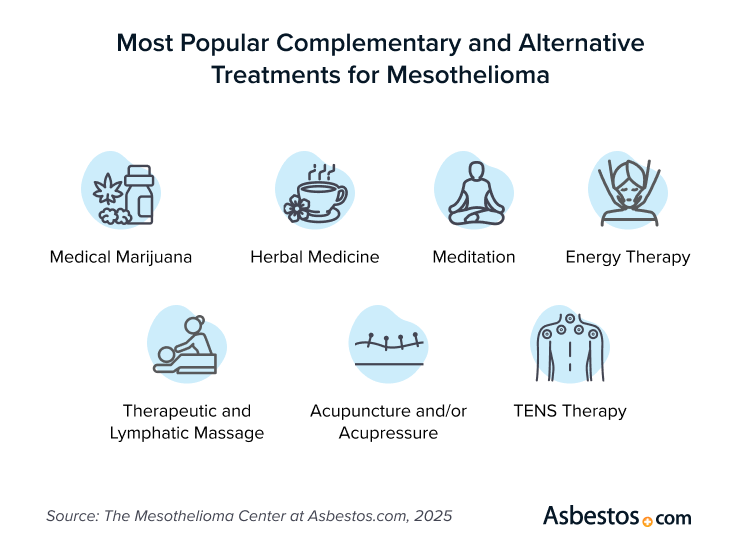
75 Francis St, Boston, MA 02115
Year Built: 1832
Number of Beds: 793 beds
Number of Physicians: 4
Complementary and alternative mesothelioma treatments aim to ease symptoms and side effects of treatment. Common therapies for mesothelioma include acupuncture, meditation, yoga and medical marijuana. Other options are herbal medicine and energy therapy.

Exclusive Content
Karen Selby, RN: What Do You Tell Patients About Alternative Treatments?

Exclusive Content
Karen Selby, RN: What Do You Tell Patients About Alternative Treatments?
Integrative medicine for mesothelioma combines complementary therapies and standard medicine such as chemotherapy, immunotherapy and surgery. Most people with mesothelioma use them in addition to standard treatments rather than as a replacement.
Using complementary therapies in conjunction with standard cancer treatment is called integrative oncology. It uses safe, effective and evidence-based therapies for cancer.
Common Complementary Therapies for Mesothelioma
Patients with mesothelioma may use the same therapies in alternative and complementary medicine. Their intention and approach, however, are different. Alternative medicine replaces standard mesothelioma therapies.
Integrative and alternative medicine may help some mesothelioma patients. But a lack of evidence about their efficacy means they aren’t mesothelioma treatments. If you want to try complementary medicine, speak with your doctor. Some therapies may conflict with standard methods or drugs. Not getting treatment may hurt your prognosis.

Types of complementary and alternative treatment for mesothelioma include exercise, herbal medicine and mental health therapies. Always talk to your health care provider before starting any new therapy for your symptoms.
Some therapies, like acupuncture and medical marijuana, can help manage treatment side effects. Mind-body techniques, like yoga and meditation, also lessen stress and negative emotions. Nutrition and exercise can boost your quality of life.

Survivor Story
Kim Madril: What alternative therapies helped compliment your mesothelioma treatment?
Many people with mesothelioma use medical marijuana and CBD to ease nausea, pain and stress. This therapy lets patients pick their preferred delivery method. They can smoke the dried leaves, apply topicals to the skin or eat edibles and capsules.
The Mesothelioma Center’s 2025 survey found 21% of patients under 50 used medical marijuana and 7% of patients over 81 used CBD oil. If you’re considering using cannabis, talk to your doctor. Medical marijuana isn’t legal in all states, and federal law prohibits its use.
Some mesothelioma patients have used cupping therapy to stimulate blood flow. A practitioner heats the cup and then places it upside down on the patient’s skin. As the trapped air cools, the cup creates a vacuum, pulling up the skin. Cupping is an ancient therapy that may treat a variety of symptoms, such as inflammation, pain and stress.
Some cancer patients report relief from symptoms with cupping. Pleural survivor Kevin Hession has used cupping for pain after his chest surgery. But evidence for cupping is scarce. It may be a useful treatment for lower back pain. Patients should discuss with their doctor if they want to use it for lung injury and respiratory diseases.
Most oncologists recommend gentle exercise to mesothelioma patients. Light exercise can ease side effects, reduce fatigue and improve mood. It can also boost quality of life. Adding exercise to a patient’s treatment plan lowers the risk of death and cancer recurrence.
Exercise improves cardiovascular fitness in mesothelioma patients. This helps them cope with surgery and chemotherapy. Gentle exercise can improve sleep. It helps people rest and recover better. Dr. Diana Molinares, director of oncology rehab at Sylvester Comprehensive Cancer Center in Miami, recommends frequent light exercise. It can help build a routine and fight fatigue.

Learn about the latest mesothelioma treatments and clinical trials in our updated 2026 guide.
Get Your Free GuideHerbal medicines and dietary supplements, like vitamins and minerals, are another form of complementary medicine for mesothelioma patients. Sellers of herbs and supplements claim to boost wellness. But the FDA doesn’t regulate supplements.
People with mesothelioma should be cautious with herbal medicines and supplements. These substances don’t have to pass the same safety tests as prescription and over-the-counter drugs.
Herbal remedies, such as turmeric and mistletoe extracts, are popular choices among mesothelioma patients. These herbs are in traditional Chinese medicine.
Beta-glucans are sugar compounds that may support the immune system in people with mesothelioma to fight infection and diseases. Beta-glucans don’t attack cancer directly, but they indirectly stimulate the immune system to attack cancer cells. Beta-glucans are first absorbed in the small intestine and broken into smaller parts, which then enter the bloodstream and interact with bone marrow and the immune system.
Beta-glucan may benefit mesothelioma patients, supporting the immune system through improved gut health. A 2023 study found that beta-glucan improved the gut health of colon cancer patients to reduce inflammation and promote cancer cell death. Taking a beta-glucan supplement carries a risk of side effects, including changes to blood pressure and gastrointestinal distress.
Mental health therapy is vital for people with mesothelioma. It helps them cope with the mental, emotional and social challenges of their diagnosis. It’s as important as treating their physical symptoms. More cancer centers now offer counseling and support groups for patients and their families.
Mental Health Therapy for Mesothelioma
Mental health support is an integral part of the treatment of any disease. It’s often seen as a complementary therapy. Mesothelioma patients who use mental health therapy cope better with illness.
Mind-body therapies have been scientifically proven to reduce symptoms in mesothelioma patients. These methods encourage the mind to stay present and aware of the body’s functions. They promote relaxation, reduce stress and can improve health.
Mind-Body Therapy Modalities
Not every mind-body therapy suits cancer patients. Mesothelioma patients should always consult their doctor. They need safe, gentle therapies that support the body and mind without adding strain.

Ease your mesothelioma symptoms with the right food. See recipes designed for you.
Get My Free GuideProper, balanced nutrition is vital before, during and after mesothelioma cancer treatment. A mesothelioma diet can help with nausea and trouble swallowing. Some cancer centers have dietitians to help mesothelioma patients. They can create personalized meal plans.
More oncology teams are stressing good nutrition for mesothelioma. It’s a key complementary therapy. Patients can change their diet to reduce inflammation, which may improve outcomes.
Eating well is crucial to feeling physically and mentally better. Good nutrition helps you to get through your treatments in the best way possible and helps the body heal.
Energy therapies, acupuncture and other complementary therapies have helped ease mesothelioma symptoms and side effects. Talk to your doctor about which option might be best for you.
Other Complementary Therapies
Another type of complementary therapy is palliative care, which aims to ease symptoms and promote well-being. Some believe this type of care is specifically for end-stage patients. But using it earlier in treatment improves prognosis and life expectancy.
As with all complementary and alternative medicines, you should consult your doctor before using them. Some people may tout a supplement, such as Essiac tea, but your doctor is the only person whose medical and health advice you should follow.
Essiac is a blend of herbs, usually consumed as tea, promoted as a cure for cancer. No research of the herbal blend has been conducted on people with mesothelioma. Clinical studies show Essiac doesn’t cure cancer, and it may even promote the growth of certain cancers. An Essiac tea benefit is that it’s high in antioxidants.
The U.S. Food and Drug Administration cited a brand of Essiac tea on a list of fake cancer cures that consumers should avoid in 2009. Consumption of Essiac for cancer isn’t highly likely to cause serious side effects. But people with mesothelioma should get approval from their doctor before they try any herbal remedy.
Essiac tea side effects include skin problems, heart problems, nausea and vomiting. A 2022 case report published in Heart Rhythm described a patient diagnosed who drank a homemade version of Essiac tea and experienced a complete heart block. The patient required a pacemaker to fix the block.
Some mesothelioma cancer centers offer integrative oncology programs that include complementary therapies. These programs aim to treat the whole person, not just the disease.
Working with your doctor to find the right program for you is best. Find out what therapies may help your symptoms and support your treatment.

75 Francis St, Boston, MA 02115
Year Built: 1832
Number of Beds: 793 beds
Number of Physicians: 4


10833 Le Conte Ave Los Angeles, CA 90024
Year Built: 1960s
Number of Physicians: 2
Integrative oncology doesn’t promise a cure for mesothelioma. It also may not always lead to better survival rates. The goal of complementary therapies is to increase comfort and improve quality of life. These therapies can also help people tolerate conventional mesothelioma treatments.
For example, people dealing with side effects from chemo, like nausea and vomiting, may find relief through complementary therapies. When people are better able to complete their full chemo regimen, it can have a positive effect on survival.
It’s important to follow your mesothelioma doctor’s treatment plan, even if complementary therapies give some relief. Skipping standard treatments can be harmful and may lower survival chances.
Many people with mesothelioma choose to add complementary therapies to their conventional treatment plans. In the past, some people turned to alternative treatments because of limited effective options. Since alternative therapies don’t work consistently for everyone, most people prefer to combine complementary therapies with standard treatments like chemo and surgery.
In 2016, doctors diagnosed Jim Huff with pleural mesothelioma. He didn’t want to endure the harsh side effects of chemotherapy. Instead, he used medical marijuana, taking a dose of CBD oil twice a day. For 15 months, his CT scans showed no new tumor growth. When his cancer progressed, Huff found success with Keytruda, an immunotherapy drug. “Something is working, a combination or whatever,” Jim said. “I’m just riding this wave as long as I can.”
In 1980, doctors diagnosed Jerry Lampe with peritoneal mesothelioma. At the time, there were few treatments for the rare cancer. Doctors gave him only six to 12 months to live. A friend suggested Lampe check out the Immune Augmentation Therapy Clinic, an experimental cancer center in Freeport, Bahamas. He had daily injections of a protein mixture made from the blood of healthy donors. Today, Lampe may be the longest-living mesothelioma survivor in the U.S. “There is no way to prove now what it did or didn’t do for me back then,” Jerry said. “[The injections] built up my immune system, and I survived.”
In 1996, Sissy Hoffman had a radical surgery called an extrapleural pneumonectomy. Dr. David Sugarbaker, a pioneer in mesothelioma treatment, did the surgery. Hoffman thrives today. She eats well and does tai chi and water aerobics. It’s allowed her to take a lifetime trip to Italy and even snorkel despite having one lung. “Was it easy? No, it was not,” Sissy said. “But I am stronger for it, and I have a deeper appreciation for life.”
Supplemental mesothelioma treatment options often prove useful for managing the severity of symptoms. Many patients turn to complementary therapies. They want to ease the side effects of standard mesothelioma treatments and boost their health.
Patients considering complementary treatments should consult their doctor first. This is to avoid any negative interactions with new treatments. Doctors and a patient’s care team can recommend therapies. They can also provide info on integrative oncology centers that offer complementary and traditional treatments.
Complementary therapies often help with the side effects of standard mesothelioma treatments, like chemo. The ability to tolerate conventional treatments to completion can help increase the patient’s chances of surviving mesothelioma.
Choose complementary therapies based on your symptoms, depending on your type and severity. Medical marijuana can often manage nausea. Proper nutrition boosts well-being. A meditation practice can reduce stress. The best approach is to combine several alternative therapies.
These terms mean different approaches to treating mesothelioma. Alternative medicine for mesothelioma is any treatment that avoids standard methods. It uses only non-standard methods to treat or cure the disease. This can include a special diet instead of cancer drugs.
Naturopathic remedies are a type of alternative medicine. They use herbs and natural remedies to support the body’s self-healing. Holistic medicine treats the whole person. This approach often includes multiple therapies like integrative medicine, which combines conventional mesothelioma treatments with complementary therapies.
Certain chemo drugs, including the experimental chemo drug DX-8951f, can negatively interact with Essiac. This tea might slow the rate at which your body metabolizes certain drugs. This effect may increase a drug’s potency or prolong its effects.
A report indicates that Essiac may inhibit liver enzymes known as cytochrome p450, which play a crucial role in eliminating some cancer medications from your system.
Eating more foods that contain this type of fiber is one way to incorporate beta-glucans into your diet. They appear in a range of plant-based foods, including oats, barley, seaweed and certain mushrooms. People with mesothelioma can speak to a dietitian to learn more about eating a diet with supportive nutrients.
While many medical providers prefer patients to get nutrients such as beta-glucans through their diet, supplements are available for those who are unable to get enough nutrients through dietary changes alone. If you’re considering taking supplements, speak with your doctor about possible beta-glucan benefits, adverse drug interactions or side effects.
Stay up-to-date on treatment, research, clinical trials, doctors and survivors
The information on this website is proprietary and protected. It is not a substitute for professional medical advice, diagnosis or treatment. Any unauthorized or illegal use, copying or dissemination will be prosecuted. Please read our privacy policy and terms of service for more information about our website.
This website and its content may be deemed attorney advertising. Prior results do not predict a similar outcome.
The Mesothelioma Center’s claim as the most trusted resource is based on our more than 150 5-star Google and BBB reviews. Our organization also helps more than half of all mesothelioma patients annually diagnosed.
Your web browser is no longer supported by Microsoft. Update your browser for more security, speed and compatibility.
If you are looking for mesothelioma support, please contact our Patient Advocates at (855) 404-4592
The Mesothelioma Center at Asbestos.com has provided patients and their loved ones the most updated and reliable information on mesothelioma and asbestos exposure since 2006.
Our team of Patient Advocates includes a medical doctor, a registered nurse, health services administrators, veterans, VA-accredited Claims Agents, an oncology patient navigator and hospice care expert. Their combined expertise means we help any mesothelioma patient or loved one through every step of their cancer journey.
More than 30 contributors, including mesothelioma doctors, survivors, health care professionals and other experts, have peer-reviewed our website and written unique research-driven articles to ensure you get the highest-quality medical and health information.
My family has only the highest compliment for the assistance and support that we received from The Mesothelioma Center. This is a staff of compassionate and knowledgeable individuals who respect what your family is experiencing and who go the extra mile to make an unfortunate diagnosis less stressful. Information and assistance were provided by The Mesothelioma Center at no cost to our family.LashawnMesothelioma patient’s daughter


Asbestos.com. (2025, December 9). Integrative Medicine and Alternative Treatments for Mesothelioma. Retrieved January 22, 2026, from https://www.asbestos.com/treatment/alternative/
"Integrative Medicine and Alternative Treatments for Mesothelioma." Asbestos.com, 9 Dec 2025, https://www.asbestos.com/treatment/alternative/.
Asbestos.com. "Integrative Medicine and Alternative Treatments for Mesothelioma." Last modified December 9, 2025. https://www.asbestos.com/treatment/alternative/.

Dr. Estelamari Rodriguez is an oncologist and hematologist specializing in mesothelioma at the Sylvester Comprehensive Cancer Center in Miami, Florida.
Our fact-checking process begins with a thorough review of all sources to ensure they are high quality. Then we cross-check the facts with original medical or scientific reports published by those sources, or we validate the facts with reputable news organizations, medical and scientific experts and other health experts. Each page includes all sources for full transparency.
Please read our editorial guidelines to learn more about our content creation and review process.
